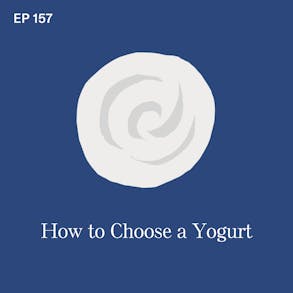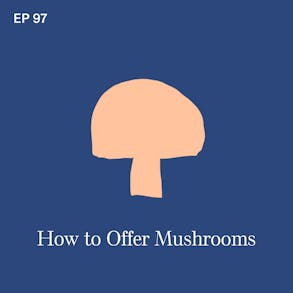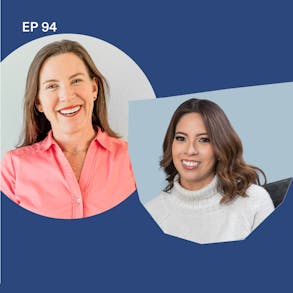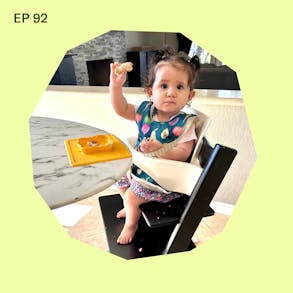Yogurt: How to Choose the Right Yogurt for Baby-Led Weaning
- WHAT type of yogurt babies can eat...and spoiler alert: you don't have to be buying baby yogurt. Babies can eat regular yogurt, but there are a few tips in this episode for what to look for when you're shopping.
- HOW to offer yogurt to your baby while still honoring the self-feeding principles of baby-led weaning. Quick tip: it involves a pre-loaded baby-led weaning spoon.
- WHICH TYPE of yogurt babies can eat, why we want to offer cow's milk protein foods early and often and why yogurt is a better bet than cheese and fluid cow's milk for babies.

LISTEN TO THIS EPISODE
Episode Description
Can babies eat yogurt? And why is yogurt ok if babies should not have fluid cow’s milk until they turn 1? In this episode we’re exploring the yogurt aisle, with tips on what to look for - and what to leave out - when you’re looking for a yogurt to offer your baby for baby-led weaning.
Links from this Episode
- Baby-Led Weaning with Katie Ferraro program with the 100 First Foods™ Daily Meal Plan, join here: https://babyledweaning.co/program
- Baby-Led Weaning for Beginners free online workshop with 100 First Foods™ list to all attendees, register here: https://babyledweaning.co/baby-led-weaning-for-beginners
Other Episodes Related to this Topic
- Episode 13: Milk Protein: How to Introduce Your Baby to this Potentially Allergenic Food
- BONUS: Purees + BLW with SLP Feeding Expert Dawn Winkelmann
- Episode 108: Should Your Baby Be Taking Probiotics? with James Marin, RD, EN and Dahlia Marin, RDN, LD
- Episode 113: Transitioning to Cow's Milk: How Do I Do This?
- Episode 79: How to Pick a Milk When Your Baby Turns 1

Latest Episodes






Katie Ferraro (0s):
And when you're at the yogurt aisle at your grocery store can be so overwhelming, but you kind of got to block out all the noise. You don't need added sugars. You got to have whole note, full fat yogurt. You don't need extra probiotics or fiber. There's a few options that work for babies. Hey, there I'm Katie Ferraro, registered dietitian, college nutrition professor and mom of seven specializing in baby led weaning here on the baby led weaning made easy podcast. I help you strip out all of the noise and nonsense about feeding, leaving you with the competence and knowledge. You need to give your baby a safe start to solid foods using baby led weaning.
Katie Ferraro (42s):
Let's imagine you're at the grocery store and you're in the yogurt aisle. Have you guys been in the yogurt aisle lately? It's insane. It's confusing. There are so many different types of yogurt. How do you choose the one that's okay for babies to eat? Well, there's actually a number of yogurt options at your typical grocery store that babies can safely eat, but there's a ton of stuff in there that you don't want to offer. So in today's episode, we're going to look at yogurt and how to choose the right yogurt for baby led weaning. Now, I like to start each of these mini baby led weaning training episodes with a B L w tip of the day. And this one is yes, you are.
Katie Ferraro (1m 24s):
Baby can and should be having dairy foods. A if the baby's not alerted to cow's milk, protein, and B, if your family eats dairy foods, if you're vegan, this is kind of not the episode for you, but we do have fairly good evidence to support the idea that offering babies, cows milk, protein foods out of around the six month mark plus when they're showing the other signs of readiness to feed that that can actually help prevent cow's milk allergy down the road. But parents and caregivers get confused because they also hear, well, wait a minute, babies. Aren't supposed to have fluid cow's milk until they turn age one. And that is true. We don't replace breast milk or formula with cow's milk until after the baby is one, but we can use yogurt as a really age appropriate way to introduce baby to that.
Katie Ferraro (2m 10s):
All important cows, milk protein. And in today's episode, I'm going to give you a few quick tips that you can employ at the grocery store to find a few options for your baby to do this safely. Now let's talk about the particulars of yogurt when it comes to babies. And when we're talking about what type of yogurt babies can eat, sometimes families will say, can you just tell me what brand to buy say? Well, no, because brands differ from depending upon where you are geographically, you know, in the United States or in the world. And we want to just avoid a few things. So there's kind of some parameters for checking out yogurt. But when we're talking about yogurt, I'm talking about like yogurt that is not marketed for babies.
Katie Ferraro (2m 50s):
And I'll talk a little bit more about baby food yogurt, but it's one of my pet peeves. If you've listened to the podcast for any length of time, yogurt that is marketed to parents as being specific for babies is ridiculous because babies can eat regular yogurt with some caveats. So there are actually even this just slays me some baby food yogurt brands that have added sugar in them. We don't feed added sugars to babies. There's some naturally occurring sugar in yogurt. It comes from sugar of milk lactose, and we don't need to go adding sugar in terms of say, I'll put it's organic sugar. Sugar is sugar is sugar. You don't need to buy a baby food yogurt for your baby. Your baby can eat adult yogurt, but not most of them.
Katie Ferraro (3m 32s):
So back to why we do it. I mentioned earlier that it's an order to help prevent cows milk allergy. If you want to learn more about milk protein, and why we do this early and often check out episode 13, it's called milk protein. How to introduce your baby to this potentially allergenic food. So how can we do yogurt? If yogurt is a puree and baby led weaning you quote-unquote don't do purees well, you actually can incorporate periods with baby led weaning periods. Aren't important texture for babies to learn how to eat. They're just not the only texture that they can. So we would use the pre loaded spoon approach whereby you would put the yogurt on the spoon. Once you figure out which one to do it and offer it to your baby in such a manner that allows the baby to self feed.
Katie Ferraro (4m 12s):
And yes, this can start as early as six months. If you're not familiar with that approach, I have a whole different episode. I did an interview with Dawn Winklemann. She is a speech language pathologist, and baby led weaning experts. She designed the tiny spoon, which is an award-winning baby led weaning spoon for the company. Easy. If you want to check out that episode, it's called purees. Plus the baby led weaning with SLP feeding expert, Dawn Winklemann. You guys are in the market looking for some baby led weaning spoons. I do love that tiny spoon from easy peasy. If you go to easy-peasy fund.com, the code KATIE10 works for 10% off, and that is my affiliate discount. So when do you offer the yogurt baby?
Katie Ferraro (4m 54s):
As I mentioned at around six months of age, sure. You could scoop it onto a spoon and shove it into a baby's mouth earlier than that. But the whole point of baby led weaning is that the baby is driving the feeding. And that happens at around at six months of age. Now some parents I might get worried and, oh my gosh, I was told never to do any cow's milk. And now my babies, almost one, if you haven't done yogurt early and often around six months of age, it's not too late. We, the one-year mark wants your baby to transition to cow's milk, but you can offer other cows milk containing foods. If you check out episode one 13, it's called transitioning to cows milk. And how do I do this? There are particulars in there for older babies, but let's go back to, let's say you're getting ready to start solid foods. Yogurt is one of the best ways to introduce calcium protein.
Katie Ferraro (5m 36s):
You're at the grocery store, which type of yogurt do you buy? There's two things that we want to look for when we're selecting yogurt for baby led weaning the one. And these are not in any order of importance. They're equally important is that you're choosing places. Yogurt, not vanilla, not fruited, not whatever else is out there. We want plain and plain is because it has no added sugar. So even when you see like fruited yogurt at the store, read the ingredient list, there will be added sugar in there. And there's actually no actual fruit in there. If you, as an adult who can tolerate different textures together, because you've been eating for years would like to have fruited yogurt, you'd take regular yogurt, and then you take regular fruit and you can combine them together, but fruit and yogurt, as you know, and like if you stir it up and it looks like there's strawberries in there, read the ingredient list, there's going to be zero grams of fiber indicating that there's minimal amount of real fruit, if any, and there are almost certainly be added sugars.
Katie Ferraro (6m 31s):
And again, we'll look at the added sugars line on your food label. It should be at zero for babies, vanilla, sometimes trips people up. He's like, oh, it looks like plain. It looks like lean, but it, the vanilla flavoring has added sugar in it. So we don't want to do that for babies. The second thing we look for after it having no added sugar is that we're trying to select a full fat or whole milk yogurt. Okay. So we want to avoid to the greatest extent possible non-fat or reduced fat or low fat or skimmed milk products. Okay. Is it the end of the world if your baby has a bite of plain skim milk yogurt? No, of course not. But if you're going to the store to buy something that your baby can eat, select the full fat or whole milk version, because babies need that fat for their brain development.
Katie Ferraro (7m 15s):
Now, of course, early on, baby's not eating foods for quote unquote nutrition, but as they get in the habit and the weaning process sets in, which is starting to get more new nutrition from food and less nutrition from milk babies will be needed. You get that from other sources besides breast milk or formula. So we want to make sure that we're purchasing the right kind. So sometimes parents will ask, well, what percent am I looking for? There are certain brands where it's 5% indicates that that's a quote unquote, whole milk product. We just stay away from the 2% and the 1%. But again, it's not the end of the world. If your baby has some, it's just, if you're purchasing this regularly, look for the whole milk. So again, two takeaway messages are no added sugar and that it's a whole milk or full fat yogurt.
Katie Ferraro (7m 55s):
Now you have to go to your own grocery store and do a little bit of sleuthing and don't get overwhelmed by the vast majority of what's in the yogurt aisle. It's these value added foods with the perception of this has more probiotics, or this has a more of XY or Z nutrients. Some of them have fiber in them, which is asinine because dairy foods don't have, or in them. And we don't want your baby getting full of all of these fake or isolated, functional fibers that are sometimes added two yogurts that are technically diet foods for adults. So go back to basics, find a store, brand, whole milk, no added sugar. Now what about baby food yogurt? The one that kills me is when you go to the aisle of baby food at the grocery store and they're shelf stable yogurt, there is one brand out there and it's laughable because if your yogurt is shelf stable, it's clearly not yogurt.
Katie Ferraro (8m 40s):
There's so many additives and preservatives, and certainly added sugar in those. So just stick to the refrigerated aisle and get real yogurt. I mentioned probiotics and parents sometimes ask them, does my baby need to have added probiotics? And I'd actually did a whole interview. Episode is episode 108 called probiotics. Should your baby be taking probiotics? And I did that with James and Dalia Marin. They're registered dietitians who specialize in gut health and functional medicine. They did a really nice summary of the very, very limited range of babies who had benefit from probiotics, but that the vast majority of babies would not need or benefit from supplemental probiotics. And when you offer your baby regular yogurt with live active cultures, they're going to be eating a probiotic food.
Katie Ferraro (9m 23s):
So you don't need to go buy a value added yogurt. That costs a lot more because there's not going to be any benefit for the most part. So if you want to learn more about probiotics, again, check that out. It's episode 108. And once you do yogurt, you can offer it regularly, but don't get in the habit of offering it. Every meal, some parents like, oh my gosh, my baby loves yogurt. Yes, it is a tad on the sweet side because it has that milk sugar. It's easy to serve, but we don't want to offer anyone food to baby day in and day out. They really need to be seeing that variety. So I hope you guys got a little bit of knowledge about how to select a yogurt for baby led weaning. Don't get bogged down by the brand. I don't give round recommendations because they vary so much.
Katie Ferraro (10m 3s):
There's two or three options at most grocery stores that will work for you. And once you figure it out, you can put it on your shopping list and it can be a food that you offer to your baby early and often again, not every day. Thanks so much for listening and I'll catch it next time.

The Program Baby-Led Weaning with Katie Ferraro
A step-by-step digital program for starting solid foods safely and navigating the original 100 FIRST FOODS™ meal plan with baby-led weaning.
 EXPERT-LED, PROVEN APPROACH TO EATING REAL FOOD
EXPERT-LED, PROVEN APPROACH TO EATING REAL FOOD CONCISE VIDEO TRAININGS TO MASTER BABY-LED WEANING
CONCISE VIDEO TRAININGS TO MASTER BABY-LED WEANING 100 FIRST FOODS DAILY MEAL PLAN WITH FOOD PREP VIDEOS
100 FIRST FOODS DAILY MEAL PLAN WITH FOOD PREP VIDEOS
Baby-Led Weaning for Beginners Free Workshop
Is your baby ready to start solid foods, but you’re not sure where to start? Get ready to give your baby a solid foundation to a lifetime of loving real food…even if you’re feeling overwhelmed or confused about this next stage of infant feeding.
Get baby-led weaning recipes and tips delivered to your email inbox.

